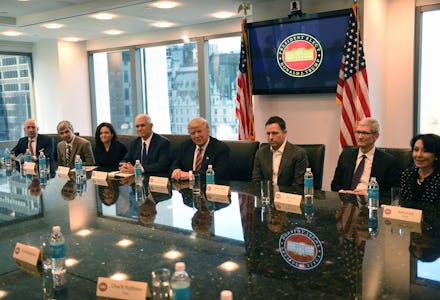Silicon Valley's opposition to Trump's travel ban completely misses the point

President Donald Trump's executive order banning the entry of visa holders from seven Muslim-majority countries to the United States has stirred some Silicon Valley giants to speak up. Finally.
Facebook, Apple, Uber and Alphabet (Google's parent company) are among a group of tech companies penning an open letter to Trump in response to his immigration ban. Their message, which Re/code obtained, is simple: This executive order is simply bad for business.
"As entrepreneurs and business leaders, our ability to grow our companies and create jobs depends on the contributions of immigrants from all backgrounds," the letter reads in part. "We share your goal of ensuring that our immigration system meets today's security needs and keeps our country safe. We are concerned, however, that your recent executive order will affect many visa holders who work hard here in the United States and contribute to our country's success. In a global economy, it is critical that we continue to attract the best and brightest from around the world." (Read the full letter here.)
Silicon Valley puts a lot of effort in showing to the public it's trying to do the right thing: It wants to connect the world; it wants to change the world. But this statement smacks of opportunism, not altruism. The most powerful voices in tech were quiet when Trump called Mexicans "rapists," or when he said he "absolutely" wanted to implement a Muslim registry. They were silent when he bragged about grabbing women by the pussy. (Isn't workplace sexual assault just as bad for a business' bottom line?)
Banning people with legal immigration status from the United States is xenophobic, unethical, inhumane and arguably illegal. This letter signals none of that. Instead, its biggest concern is Silicon Valley's ability to bring in the "best and the brightest." Pointing out a person's economic value is not opposition to the inhumanity of the ban — it's affirming Trump's own priorities. It is also an appeasement to Republicans, and a weak one at that, considering the party believes immigrants are taking the jobs of native citizens.
The draft continues:
"The business community shares your commitment to growing the American economy and expanding job creation across the country. We hire both thousands of Americans and some of the most talented people from abroad, who work together to help our companies succeed and expand our overall employment. As you contemplate changes to the nation's complex and interconnected immigration policies, whether business and employment-based visas, refugees, or DACA, we hope that you will use us as a resource to help achieve immigration policies that both support the work of American businesses and reflect American values."
The letter again points out the need for "some of the most talented people from abroad." It makes sense, business-wise, why Silicon Valley would be against bans that negatively impact its bottom line — especially with reports that another executive order aims to change "the work-visa programs technology companies depend on to hire tens of thousands of employees each year." It's worth noting that critics of the H-1B visa program believe it allows tech companies to bring in talented workers for cheaper.
Pointing out a person's economic value is not opposition to the inhumanity of the ban — it's affirming Trump's own priorities.
"The fundamental problem is you can legally pay H-1B (visa holders) less than American workers," Ronil Hira, a public policy professor at Howard University who has testified before Congress in favor of reforming the visa program, told the Mercury News. "And that creates an incentive to prefer H-1B workers over American workers."
Defending immigrants based on their work value misses the point. They matter because they are people, not because they may be the next Steve Jobs.